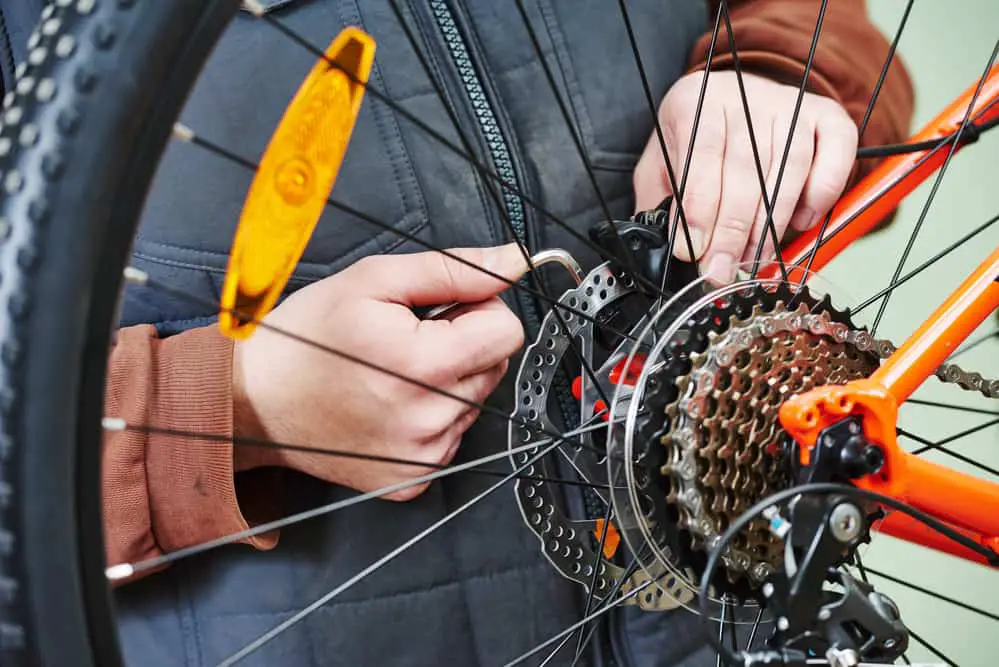I recently hit my highest speed ever on a bike. I was descending a steep hill and hit a maximum speed of 38 miles per hour, which is very fast for me. It was a little scary to go that fast, but I had faith that my bike (and especially my brakes) was in good working order. For reasons like this, regular bike maintenance is critical, especially when you often ride or at high speeds.
As I looked for the best way to maintain my bike, I started researching bike tune-ups. I asked myself,
Is a bike tune-up worth it? Should I try to do this kind of work myself?
Bike tune-ups are worth it when you ride frequently or at high speeds because you want your bike to be safe and in good working order. Bike tune-ups are also worth having done by a bike shop because a trained bike mechanic will have all the skills, knowledge, and specific tools to take the best care of your bike.
However, if you are very skilled, there are some aspects of bike maintenance that you can do yourself.
In this article, we’ll look at what bike tune-ups include and get an estimate on how much they cost. After that, you’ll be able to decide what bike maintenance you feel comfortable doing yourself and what you might want to have done by your local bike shop. But first, let’s take a look at just why your bike needs tune-ups.
Why Your Bike Needs Tune-Ups

There are several reasons your bike needs regular tune-ups. Here are a few examples you might want to consider.
1. Bikes are an Investment
Just like a yearly car inspection which keeps your car safe for driving on the road, your bike needs a regular inspection, too. Regular service and maintenance will keep your investment running smoothly and keep you safe on the road.
2. To Get Your Bike Good and Clean
A clean bike is an efficient bike. And bike shops can take your bike apart to clean in all those hard-to-reach spots you might miss.
3. To Keep Your Brakes Working Well
Good brakes are one of the essential parts of a bike. You might need a tune-up to ensure your brakes aren’t rubbing, squeaking, worn-out, or misaligned.
4. To Keep Your Gears Shifting Smoothly
If you’ve ever tried to climb and your bike just won’t shift into your easiest gear when you need it, you’re going to need that tune-up. Or, if your bike is jumping gears, making noises when shifting, or just not shifting smoothly, you should get your bike in for a tune-up.
5. To Keep Your Tires in Good Shape
Old tires, tires that are worn down or dry rotted from not being used, can be more prone to flats and even dangerous. Your local bike shop can tell you when it’s time for new wheels.
6. To Prevent Small Problems from Becoming Big Problems
A tiny problem can develop into a much larger, more expensive problem over time. However, regular tune-ups can catch issues before they become something more serious and hard to fix.
7. To Catch Safety Issues
You want your bike to be as safe as possible. A bike shop can catch safety issues during a tune-up, so you don’t have to worry about a loose headset or other problems that could pose a danger.
8. To Check Bearings, Bolts, and Other Small Items
A bike shop will know to check all the little things on your bike, too, from bearings you might not see to loose bolts. They can add threadlock, sealants, and lubricant in all the right spots, too, so your bike is in tiptop shape for your next ride.
Those are some of the reasons you might need to get your bike into the local bike shop for a tune-up and safety check. But not all bike tune-ups are created equal, so let’s talk about what bike tune-ups include.
What Bike Tune-Ups Include
Every bike shop is different, and some shops will have different levels of tune-up. For example, Trek Stores, across the United States, have three levels of bike tune-ups, and each level involves various services. You select which level of service you want based on how many hours you have ridden your bike. Some of the items you could most likely manage yourself, while other items on the lists require more expert tools and knowledge to do well.
If you are looking for a basic bike tune-up, it would typically include some combination of the following:
- adjustments to the gears
- brakes
- hubs
- bottom bracket*
- headset
- minor wheel truing*
- lubrication of the drive train
- safety inspection*
Some of these items are easy to learn and master, such as lubricating the drive train and adjusting the gears. However, wheel truing requires special tools, and bottom brackets can be finicky to get just right. A bike mechanic is specially trained to complete a safety inspection and may catch issues that the average person would miss, such as loose bolts or leaking brakes. Keeping your bike safe and running smoothly is well worth the checkup.
A more in-depth bike tune-up is needed when you’ve done more hours of riding. It will include most of the services listed above, as well as :
- Drive train overhaul
- Complete wheel truing*
While this tune-up level is more expensive, if you’re having issues with your bike shifting or the wheels are out of alignment, it might be worth it. Wheel truing requires a high level of skill and some specific and expensive tools to complete. A mechanically inclined person could learn to do a drive train overhaul, although you may prefer to have your LBS complete it anyway.
Complete bike overhaul
If you have put a lot of miles on your bike, or it just feels off, you might want a complete bike overhaul. This will likely include:
- Everything mentioned above
- Complete disassembly /reassembly of bike*
- Grease bearings and repack hubs*
- Replace all cables *
- Polish frame
*Services marked with an (*) may require a high level of technical skill and/or specialized tools.
Bike tune-ups can be a lot of work, but to know if they are truly worth it, you might need to look at how much a good bike tune-up will cost.
How Much Bike Tune-Ups Cost
The Velo Shop, a local bike shop in Southeastern, Pa, charges $80 for a basic bike tune-up. These are pretty standard services that you might find in any basic bike tune-up. Basic bike tune-ups start at around the $80 range.
There are also “come-to-you” style services with comparable prices, like Mr. Ed’s Mobile Bike Repair. A mobile service like this one is an exceptional value for the time-conscious cyclist and makes it easy to get your bike worked on.
The Velo shop also offers a deluxe tune-up, including all of the items in the basic tune-up plus a few additional items for $150.
If your bike has seen better days or you are a very frequent rider, you might want a complete bike overhaul for $200 plus.
Although bike tune-ups are a little bit of an investment, you can plan for it by knowing how often you need to have one done.
How Often Does Your Bike Need a Tune-up
You need to tune up your bike at least every 2000 miles or twice a year, whichever comes first. If you are a heavy user, you’ll want to have your bike tuned up more often. If you are experiencing problems with your bike, you’ll want to get it to the shop for a tune-up.
For example, if it makes weird noises, doesn’t shift well, or has been in a crash, you should get your bike tuned up. It’s better to have it checked for something minor than ignoring a problem that could end up being very serious. Read our separate article about how often bikes need a tune up to learn more.
And although you need to get regular tune-ups, is it better to have the local bike shop take care of it, or should you do it yourself?
Is It Better to Do It Yourself?
If you have the skills, knowledge, and tools required to do bike maintenance, it might be better to do it yourself. You’ll be able to save money on the cost of the care. You’ll also save time by not having to take your bike to the shop, and you’ll also save yourself the inconvenience of not having your bike while it is in the bike shop.
If you know how to do your own bike tune-ups, you can easily give your bike a quick check frequently. However, there is definitely a bonus to having an impartial person examine your bike for safety and mechanical issues. They will likely be able to catch problems you might have missed because you are so used to how your bike handles.
A bike mechanic can also help you with your bike fit, any upgrades you might be interested in, and helping you keep on top of keeping your bike in the best riding condition.
If you want to work on your own bike maintenance, you need to know how to do it.
Also, a bike stand can be very helpful when doing your own bike maintenance. However, do you really need it? Check out our article on bike repair stand to learn more.
How to Tune Up Your Bike
Doing your own bicycle maintenance can save you time and money. GCN gives a quick rundown of what a bike tune-up entails here, with links to detailed videos for each item.
